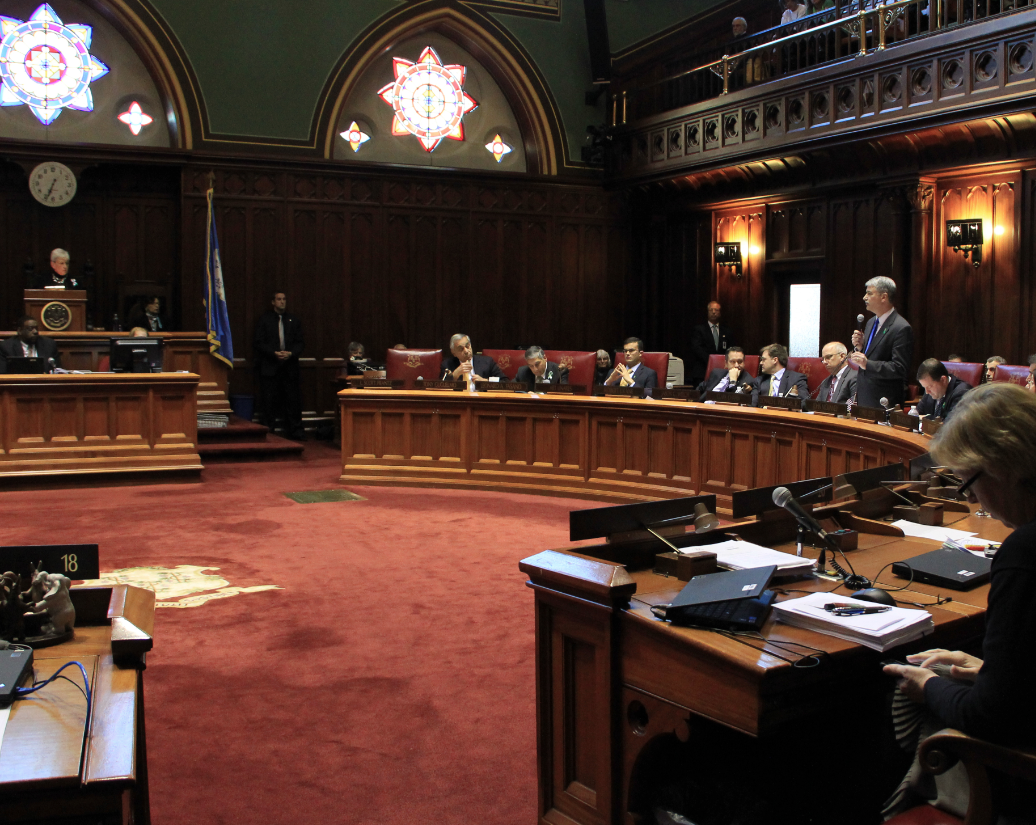
After an uproar within its base, the Democratic leadership of the Connecticut State Senate has reversed its proposal to suspend the Citizens’ Election Program to balance the state budget.
With the state facing a daunting budget deficit, the Democratic leadership of the General Assembly proposed a slate of $350 million in budget cuts on Monday. Included in that slate was a proposal to suspend the CEP, which funds candidates’ campaigns for state legislature and statewide office, for the 2016 elections. But outrage within the Democratic rank-and-file forced Senate President Martin Looney, D-New Haven, to unveil a new set of budget proposals that would keep the CEP.
The Democratic backlash against the proposal to cut the CEP — which was founded after a series of high-profile corruption cases in Connecticut that culminated in former Gov. John Rowland’s resignation — came swiftly after Monday’s announcement. In a news release Wednesday, State Elections Enforcement Commission Executive Director Michael Brandi said the commission, which administers the CEP, would oppose any budget that suspended the program.
“There should be no question that if the CEP is defunded and suspended for 2016, clean elections in Connecticut are over,” Brandi said in the release. “If, as some have said, candidates ‘could revert back to the old 2005 system’ then we’re talking about returning to the same environment that created the need for the CEP in the first place.”
Brandi added that the proposed suspension would deliver a “mortal wound” to the CEP, leaving it without adequate funding for the 2018 elections.
Secretary of State Denise Merrill also registered her opposition to cutting the CEP, asserting in a Wednesday statement that clean elections are important in preventing corruption, especially in an “era of dark money and Citizens United.” Two influential nonprofit organizations — the U.S. Public Interest Research Group and People for the American Way — joined her in putting out statements in support of the CEP.
“We want to make it abundantly clear that no one in Connecticut thinks we should have more special-interest money in politics,” Connecticut PIRG Director Evan Preston said at a Thursday press conference in Hartford with a group of Democratic lawmakers and nonpartisan nonprofits.
State Rep. Sean Scanlon, D-Gilford, said the CEP allows legislators to spend less time fundraising and more time interacting with their constituents. State Rep. Gregg Haddad, D-Mansfield, agreed.
Haddad, who has used CEP funding in each of his three election campaigns, said the program obviates the need for elected officials to ask for favors from lobbyists and special-interest groups, and instead makes them more accountable to their constituents.
State Rep. Matt Lesser, D-Middletown, said he has heard concerns from dozens of constituents since the Democratic leadership proposed axing the CEP on Monday. He said his constituents have expressed their pride in the program and have asked him to do whatever possible to prevent its elimination.
“I heard from a staffer in this building that the problem is that clean elections do not have a constituency,” Lesser said. “But my phone has been ringing off the hook this week … voters from this state expect more from Hartford, and they look at this program as something we can be proud of.”
Suspending the CEP for the 2016 elections would have saved the state $11.7 million. The new slate of budget cuts also reverses the original Democratic proposal to put $35 million from the state’s Rainy Day Fund toward reducing the deficit and restores a proposed cut of $17 million to the Special Transportation Fund.
In a Thursday release, House Speaker Brendan Sharkey, D-Hamden, said he is pleased that the Senate Democrats have proposed keeping the CEP and is confident that the state will be able to close its budget deficit without suspending the program.
The largest cut in the new proposals stems from a plan that originated with the Republicans — a retirement incentive program proposed by Senate Minority Leader Len Fasano ’81 last Friday. The Senate Democrats say the program would save $80 million in fiscal year 2016 and $96 million in the following year.
The Democrats are the last of the three groups in Hartford to make their proposals public. Gov. Dannel Malloy and the state’s Republican leadership announced their proposals late last week.
Interested in getting more news about New Haven? Join our newsletter!







